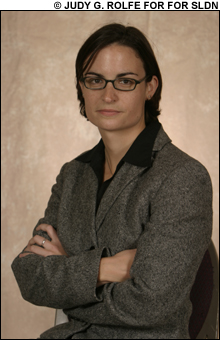 Brain injuries. Burns. Broken bones. Infections. Military medics, both overseas and here in the United States, face these wounds and more on a daily basis. Recent advances in medicine and technology, however, have enabled medics to save the lives of 86 percent of all American soldiers injured in Iraq.
Brain injuries. Burns. Broken bones. Infections. Military medics, both overseas and here in the United States, face these wounds and more on a daily basis. Recent advances in medicine and technology, however, have enabled medics to save the lives of 86 percent of all American soldiers injured in Iraq.
But imagine being one of those wounded soldiers, awaiting treatment at one of several “combat support hospitals” set up in the war-torn country. Imagine waiting in pain for treatment and being told that the physician who could have tended to you sooner was sent home — because she was gay.
Laura Galaburda was training at Andrews Air Force base to become a medic. Her work could have included being part of “forward surgical teams” in the field, treating patients in hospitals overseas, or working at medical facilities here, such as the Walter Reed Army Medical Center in Virginia.
But Galaburda is a lesbian, and she chose to come out to her commander.
“I felt like every day I was lying,” she recalls. “I knew that there was absolutely no way that I was going to be able to do that for one more day. As a physician, you expect to have a certain relationship with your patients — you expect honesty from your patients — so I couldn’t lie.”
Galaburda was discharged in 2003, under the Pentagon’s anti-gay “Don’t Ask, Don’t Tell, Don’t Harass, Don’t Pursue” (DADT) policy. Today, the 30-year-old, who recently moved from Jamaica Plain to Andover, is completing her residency as a civilian, and paying back, in monthly installments, close to $100,000 in medical-school fees to the Department of Defense.
“I watch the news every day and you hear how many people are getting injured and killed overseas,” says Galaburda, who is suing the DoD with 12 other plaintiffs for denying gays and lesbians the right to serve their country. (See “Don’t Ask, Don’t Tell Comes Under Fire,” December 17, 2004.) “And I look at myself, and with all of this training, I’m just sitting here. It’s kind of amazing to me, that they say that they don’t want us over there when you look at how strapped our forces are.”
Of the more than 10,000 gay and lesbian service members who have been fired under DADT since 1993, 244 were health-care and medical specialists, according to a report released this month by the California-based Center for the Study of Sexual Minorities in the Military, a research branch of the University of California. They are surgeons, dentists, nurses, pharmacists, lab technicians, and general physicians — all of whom received their military medical education with taxpayer money, and some of whom had been enlisted for more than 15 years. They’ve all been discharged, even as American soldiers fight on in Iraq and Afghanistan, and the DoD struggles to meet recruitment targets. (See“Come Die in Iraq,” December 2, 2005.)
This isn’t the first time we’ve seen the dangerous consequences of this flawed policy. Last year, a General Accounting Office report showed that DADT was costing the military millions of dollars, and draining its forces of highly trained troops — including 37 Arabic translators, among other linguists (see “Getting the Boot,” March 11, 2005).
“There’s a meaninglessness to it that really disturbs me,” says Elizabeth “Bitsey” Recupero, a 40-year-old ROTC graduate and pediatrician from Stoughton who was discharged from the military in 2000 for being a lesbian. “I could have gone to Fort Drum, I would have had a pretty good position. I graduated top of my class. I’m proud to think I would have been more of an asset to the Army than a hindrance.”
She said so in a letter she sent to Colonel Timothy Cannon, informing him that she was a lesbian and that she lived with her partner, with whom she obtained a Vermont civil union in 2000. “I do not believe that serving as an Army Physician and being a lesbian are incongruous,” she wrote, “as both my marriage and my career are sources of great pride.”
But the Pentagon didn’t think so.
Not only was Recupero discharged, but she fought for five years — with the help of the Servicemembers’ Legal Defense Network (SLDN) — just to get her discharge papers to show that her discharge was honorable. (SLDN, which is spearheading Galaburda’s lawsuit, Cook v. Rumsfeld, gets about 1000 calls per year from discharged homosexuals, according to spokesman Steve Ralls.) In almost every piece of correspondence, Recupero’s lawyer told the Pentagon: “I remind you that CPT Recupero stands ready, willing and able to serve our nation in uniform.”